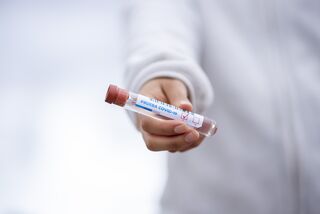Placebo
A “Striking” Link Between Vitamin D Levels and Omicron
Low levels are associated with the severity of Omicron and other variants.
Posted February 13, 2022 Reviewed by Gary Drevitch
Key points
- A low vitamin D3 level is associated with severe COVID-19 illness.
- Results are equally relevant for Omicron as for previous strains, and likely those still to come.
- Vitamin D affects many organs and the immune system.
- A study is the first to examine existing vitamin levels in people before they contracted COVID. “We found it remarkable, and striking,”

A recent study by Israeli scientists found “striking” differences in the chances of contracting severe COVID-19 illness between individuals with sufficient levels of vitamin D prior to catching the virus and those who did not.
Half the vitamin-deficient people developed severe, life-threatening illness compared to fewer than 10 percent of those who had normal levels. The study is the first to examine existing vitamin levels in people before they contracted COVID. “We found it remarkable, and striking,” said the lead author, “to see the difference in the chances of becoming a severe patient when you are lacking in vitamin D compared to when you’re not.”
The data come from 253 people who were admitted to a hospital between April 7, 2020 and February 4, 2021—a period of time before the highly-infectious Omicron variant appeared. The results, however, are “equally relevant” for Omicron as for previous strains, say the study authors.
Vitamin D is naturally synthesized in human skin and requires direct exposure to sunlight (specifically, UV-B). Artificial light, no matter how bright, doesn’t cut it. Given how the pandemic has kept many people primarily indoors for over two years, it is easy to see how a considerable number of individuals might have fallen below the threshold for adequate vitamin levels—which conventionally is at least 20 nanograms per milliliter of blood. New data, however, indicate that even this is too low: A minimum level of 50 nanograms per milliliter is now advised. Levels below this are believed to cause weak innate immune responses in patients hospitalized with COVID.
Diet plays a much lesser role in the vitamin’s intake and maintenance. It is soluble in fat rather than water, and found in foods such as fresh fatty fish, mushrooms, egg yolks, full-fat yoghurt, beef liver, and duck. For most people with inadequate sun exposure, the only practical way of ensuring good levels is with vitamin D3 supplements.
Throughout the life span the vitamin regulates the metabolism of calcium, which is crucial for the development and maintenance of healthy bones. It prevents rickets in children and osteoporosis in adults. The latter results in brittle bones and, correspondingly, otherwise avoidable fractures. Muscle and bone weakness also render individuals prone to falls. Its active metabolite acts as a hormone that targets the kidney and other organs, giving it a role in heart disease, diabetes, cancer, and immune cells (a complex topic beyond the scope of this post).
Research published in The Lancet and compiled before the emergence of COVID varieties found that, compared to dummy drugs (placebo), adequate vitamin D also reduced the risk of contracting other respiratory infections.
The Israeli researchers cautioned that vitamin D was only “one piece of the complex puzzle” underlying cases of severe COVID-19. It alone doesn’t constitute proof of cause. Yet it does seem to serve as a useful marker to flag individuals who may go on to develop serious illness.
You can read my follow-up column here. Thanks for reading.
References
Pre-infection 25-hydroxyvitamin D3 levels and association with severity of COVID-19 illness. February 3, 2022. PLOS One. https://doi.org/10.1371/journal.pone.0263069
Vitamin D, an essential nutrient with versatile functions in nearly all organs. International Journal of Vitamin and Nutritional Research 10.1024/0300-9831/a000151.
Vitamin D supplementation to prevent acute respiratory infections: a systematic review and meta-analysis of aggregate data from randomised controlled trials. The Lancet: Diabetes and Endocrinology. https://doi.org/10.1016/S2213-8587(21)00051-6
Association Between Preoperative 25-Hydroxyvitamin D Level and Hospital-Acquired Infections Following Roux-en-Y Gastric Bypass Surgery
S. A. Quraishi, et al. JAMA Surgery Vol. 149(2) Pages 112-118. DOI: 10.1001/jamasurg.2013.3176
Chauss, D. et al. Autocrine vitamin D signaling switches off pro-inflammatory programs of TH1 cells. Nature Immunol 23, 62–74 (2022). https://doi.org/10.1038/s41590-021-01080-3.


